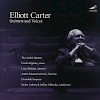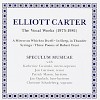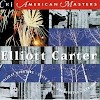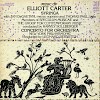Syringa for mezzo-soprano, bass, guitar, and ten instrumentalists
Recordings (4)
- Bridge Records BCD 9014 (1993)Christine Schadeberg, soprano | Patrick Mason, baritone | Speculum Musicae | Jan Opalach, bass-baritone | Jon Garrison, tenor | Patrick Mason, baritone | Speculum Musicae (+8)



